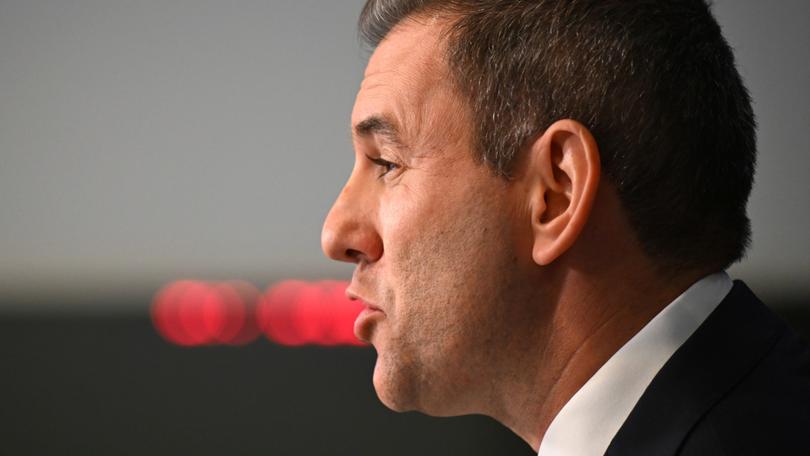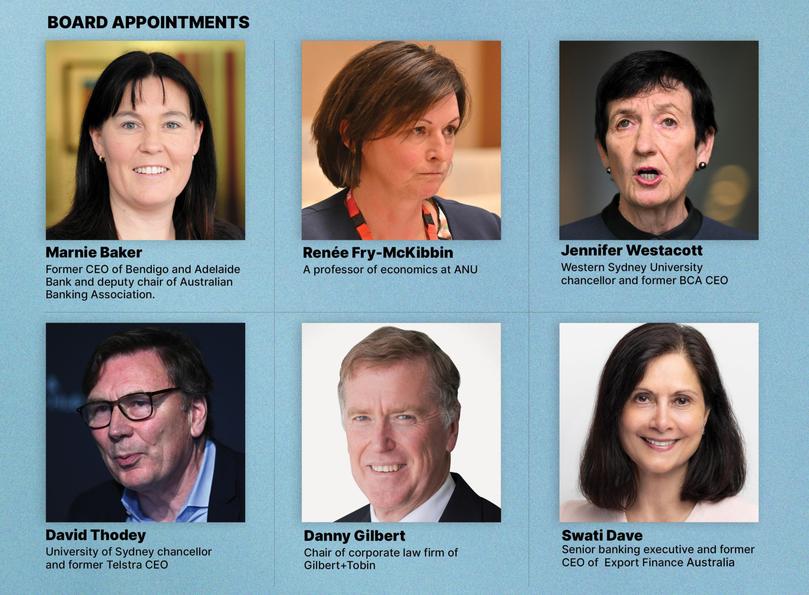JACKSON HEWETT: The new ‘eminently sensible’ RBA board members are just what the doctor ordered
JACKSON HEWETT: In a week when most attention has been on the increasingly widening budget chasm to be announced Wednesday, Chalmers has put some ‘eminently sensible’ people into the job.

Treasurer Jim Chalmers can tick off another of his reforms on his to-do list before the end of the year, in appointing some esteemed citizens onto a new board designed to shake up interest rate setting.
In a week where most attention be on the increasingly widening budget chasm to be announced Wednesday, he has put some “eminently sensible” people into the job, according to independent economist Saul Eslake.
They will have their work cut out, as the world rapidly changes and global trends become harder to read as Donald Trump enters the White House and China looks to restart its stalled economy.
Sign up to The Nightly's newsletters.
Get the first look at the digital newspaper, curated daily stories and breaking headlines delivered to your inbox.
By continuing you agree to our Terms and Privacy Policy.Shadow Treasurer Angus Taylor tried to generate some outrage that Dr Chalmers is fiddling with the RBA composition while the Budget burns, but as political point scoring rows go, this one will be quickly forgotten.
Taylor was at pains to criticise the new structure, not the individuals. In his heart of hearts there is no way the son of a fourth generation NSW sheep farmer - who cut his teeth as a management consultant to the New Zealand dairy industry - can be anything but thrilled that Marnie Baker, the daughter of a Victorian dairy farmer who worked her way up through regional banking to become CEO is anything less than a most suitable choice to challenge the way interest rates are set.
Mr Taylor, who studied his masters of philosophy in economics at Oxford is surely similarly impressed by Renee Fry-McKibbin, who following her PhD in economics at Melbourne University, took a research role at Cambridge and has had a storied career in the profession including stints at the European Central Bank, the US Federal Reserve, the Bank of England, the Department of Prime Minister and Cabinet, and Treasury.
Dr Fry-McKibbin is one of the three highly qualified panelists who found that the RBA could use a better decision-making process, be strengthened with more expertise, and “promote deeper contestability of ideas.”
She is also the wife of former RBA monetary policy board member Warwick McKibbin, who at times has been critical of Labor’s policies.
“Renee Fry-McKibbin did a wonderful job on the Reserve Bank review,” Dr Chalmers said. “She is a person who has thought deeply about the Reserve Bank and about monetary policy more broadly, and I’m really very proud and very grateful that she’s accepted this opportunity.”
The Reserve Bank has been an international outlier in its rates deliberations.
While the rest of the world is cutting, Australia has stayed pat for over a year. It has been a source of frustration for Dr Chalmers, who in September accused the RBA of “smashing the economy” with continued high interest rates.
Perhaps he hopes that Dr Fry-McKibbin will become the Miley Cyrus of monetary policy, coming in like a wrecking ball to break the rates deadlock.
But the new monetary policy board already includes four of the original six members of the old interest rate advisory board, which means Dr Fry-McKibbin and Ms Baker will have to get pretty spicy if they are going to shake things up.

In any case, the new committee won’t come into effect until after the February rates meeting, which means it can’t offer much assistance to Labor’s re-election campaign.
A more pointed question, according to influential Australian economists is whether the committee, which currently is a combination of academics, business leaders and a former union official, are adept enough at the intricacies of macro-economic forecasting to get the policy settings right.
Most other central banks rely on technocrats with demonstrated track records in macroeconomics to set rates, which made the RBA an outlier where “monetary policy decisions are made by people who, almost by definition didn’t know much about monetary policy,” Eslake, the former chief economist of ANZ said.
The shakeup comes after the way the RBA handled the pandemic, particularly the call by then Governor Glenn Stevens that he expected rates to stay low for a considerable time. That statement was highly influential on homebuyers, many of whom are now leveraged to interest rates more than twice as high.
Warren Hogan, managing director and founder of EQ Economics and chief economic advisor to Judo Bank, said there were already changes taking place under Ms Bullock after the “mishaps and missteps of the pandemic”.
He welcomed the idea of more serious challenge to the views of the RBA members of the monetary policy committee, and agreed the biggest misstep was Stevens’ low rates call.
“The biggest mistake we saw was in the pandemic with forward guidance,” Hogan said. “We had eminent Australians, seasoned money managers and business people on the committee, and they never thought to stand up to the RBA and say, ‘giving this guidance is a bad idea.’”
Eslake said that a new monetary policy committee was no guarantee however of avoiding future mishaps.
“Having monetary policy decisions made by people who are purportedly more expert is no guarantee they won’t make mistakes, because other central banks where the decisions were made by a body as the RBA’s new one make mistakes too,” he said.
Hogan believes there is a more fundamental problem with the makeup of the committee which alongside the new members of Dr Fry-McKibben and Baker, includes the previous committee members of CSL director Carolyn Hewson, economist and former Melbourne Business School dean Ian Harper, former Fair Work Commission president Iain Ross and former Coca Cola Amatil CEO Alison Watkins. That committee is helmed by RBA governor Michele Bullock, and supported by deputy governor Andrew Hauser and Treasury secretary Steven Kennedy.
“The Treasury Secretary should not be on the board setting monetary policy. It is completely inappropriate,” he said.
Hogan believes the Treasury Secretary has a vested interest in inflation levels remaining elevated, which improves the budget position by increasing the tax take from higher wages.
“No-one benefits from inflation but in the short term, two to five years, those with concentrated power benefit, particularly when we don’t have our income tax brackets indexed, and particularly when we have our income tax is such a massive part of our government’s revenue base,” he said.

